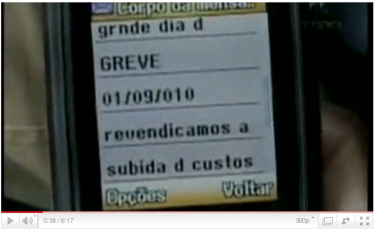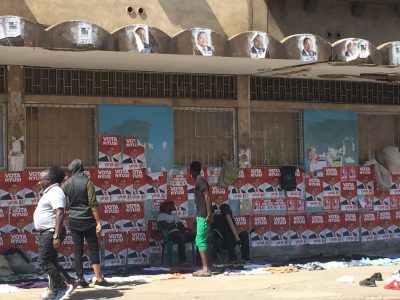
Screenshot from Youtbe video report about the popular unrest in Maputo, by Amanda Crossi, shared under a CC Attribution – Non-Comercial- Share Alike license
Much noise was made around the world about how the popular unrest against the rises in the cost of living in Maputo on September 1-2 was propagated by SMS messages by mobile users in the capital's poorer neighborhoods.
On the afternoon on September 6, pre-paid mobile phone users on both mobile carriers in Mozambique (Mcel and Vodacom) simultaneously began reporting cuts to their SMS services. Many with contracts were reporting that their services remained uninterrupted.
Both Mcel (state owned) and Vodacom (shares owned by President Guebuza) reported that they were suffering “technical difficulties” and were trying to restore services.
Mozambican Minister of Transport and Communication Paulo Zucula and regulators publicly denied any interference in mobile services.
These cuts began before, and lasted until well after, the government announcement of the measures to control prices on September 7. SMS service for pre-paid users was also simultaneously restored on both mobile networks on September 8 [pt].
On @ Verdade's Facebook wall [pt], users tried to determine what exactly happened to the service. Twitter users found this coincidence too convenient to be “technical problems” as the operators were telling customers.
On September 10, independent news outlet Mediafax reported it had a letter dated September 6 from the state mobile regulator INCM to both Vodacom and Mcel, asking that they shut off SMS services to pre-paid customers. BBC also subsequently reported seeing a copy of this letter.
@ Verdade newspaper suggests that operators were not legally bound to follow this request by government, as a state of emergency was never actually called during the unrest. The Mozambican constitution guarantees freedom of expression.
Over a week later, Vodacom spokespeople in South Africa admitted to following a government order to shut off SMS service. But both operators have refused to make any further comment.
Some Twitter users criticized Vodacom for meekly taking an order intended to censor communications. South African Vodacom customers like @2point8photo tweeted their disgust at this revelation, saying “we hold you accountable”.
Blogger JPT on Ma-schamba blog observed [pt] that government officials responsible for this calculated shut-down of communications for the poor helped deepen divisions in the city, formerly divided between “cement” and “straw” — now divided by “contract” and “pre-paid”.
Blogger Muliquela reported in a post called “Apertar” (”Tightening down”) [pt] that the government is now proposing a law that would require mandatory registration of pre-paid SIM cards in Mozambique.




8 comments